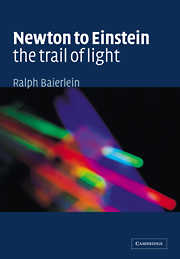 Newton to Einstein: The Trail of Light
Newton to Einstein: The Trail of Light Published online by Cambridge University Press: 05 June 2012
In chapter 11, I noted that the equation E=mc2 has given rise to a host of misconceptions. There are other issues associated with the equation, too, among them an issue of definition, and this appendix addresses some of those issues. It is written primarily for an instructor, but a student who has read appendix B will be able to understand most of it and will gain a greater perspective.
Mass in history
The word “mass” has a long history and a correspondingly long string of meanings and nuances. Max Jammer provides a fine discourse on the topic in his Concepts of Mass in'Classical and Modern Physics, cited in the “Additional resources” for chapter 11; I rely on Professor Jammer for the early history. In Roman times, the Latin word “massa” denoted a lump of dough. This sense of “lump of stuff” is what we have in mind when we “hang a mass from a spring.” By Newton's time, the word “massa” (still in Latin, of course) had come to denote “quantity of matter,” a valuable concept but one that defied attempts to make it both operationally precise and independent of any prior notion of density.
Newton recognized clearly the physical notion of inertia and hence what we would today call “inertial mass.” It was Leonhard Euler, however, who first defined inertial mass operationally as the ratio of force to acceleration (more precisely, as the ratio of their magnitudes).
To save this book to your Kindle, first ensure [email protected] is added to your Approved Personal Document E-mail List under your Personal Document Settings on the Manage Your Content and Devices page of your Amazon account. Then enter the ‘name’ part of your Kindle email address below. Find out more about saving to your Kindle.
Note you can select to save to either the @free.kindle.com or @kindle.com variations. ‘@free.kindle.com’ emails are free but can only be saved to your device when it is connected to wi-fi. ‘@kindle.com’ emails can be delivered even when you are not connected to wi-fi, but note that service fees apply.
Find out more about the Kindle Personal Document Service.
To save content items to your account, please confirm that you agree to abide by our usage policies. If this is the first time you use this feature, you will be asked to authorise Cambridge Core to connect with your account. Find out more about saving content to Dropbox.
To save content items to your account, please confirm that you agree to abide by our usage policies. If this is the first time you use this feature, you will be asked to authorise Cambridge Core to connect with your account. Find out more about saving content to Google Drive.